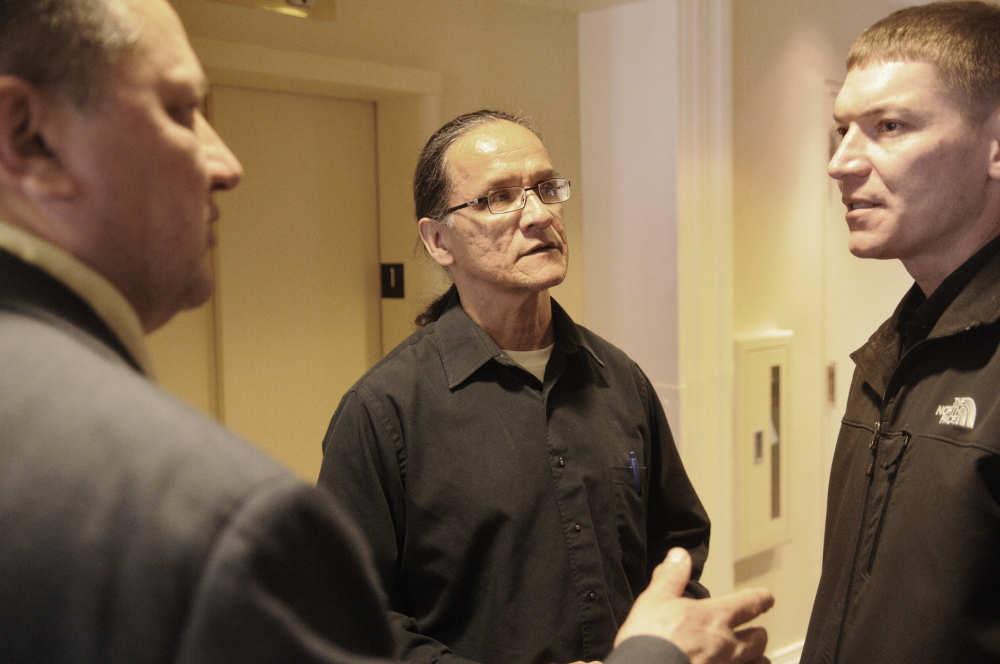AUGUSTA — Maine’s elver season will start two weeks late to give the state time to implement an emergency law enacted Tuesday by lawmakers that gives it more authority over the industry.
The legislation, sponsored by Rep. Walter Kumiega, D-Deer Isle, House chairman of the Legislature’s Marine Resources Committee, passed unanimously in the House and Senate. It was a quick, quiet passage for the bill after a tenuous few months that saw Maine Indian tribes calling it discriminatory.
By Tuesday, tension had cooled on the issue of the glassy, baby American eels, a delicacy in Japan, where the domestic elver market tanked after a 2011 tsunami, driving up prices from $25 per pound toward $2,000 per pound in Maine, one of two American states that allow elver fishing.
The law allows the Maine Department of Marine Resources to establish an annual weight quota for the elver harvest, allocating individual quotas to harvesters of the eels.
After concern over the fishery’s health was expressed by the Atlantic States Marine Fisheries Commission, the department agreed earlier this year to slash Maine’s total 2014 elver catch by 35 percent from last year’s, to nearly 11,750 pounds. Another law passed this year allows a swipe-card system for fishermen that will yield daily reporting data and make illegal harvesting more difficult, according to the commission.
Peter Steele, a spokesman for Gov. Paul LePage, said the department was pushing the season back from its normal start date of March 22 to April 5 in order to implement elements of the new laws. The limit is expected to affect the catch more than the length of the season.
Darrell Young, a fisherman from Waltham in Hancock County who founded the Maine Elver Fisherman Association, said cold temperatures are expected to delay the eels’ arrival in freshwater brooks.
“I don’t think they’re going to come screaming up the brook, by any means,” Young said.
The law approved Tuesday also directs the department to divide a share of the overall quota among Maine’s four federally recognized tribes, which will allocate the alloted amount of elvers to each tribal fisherman. Rep. Henry John Bear, of the Houlton Band of Maliseet Indians, which said it got 16 licenses in 2013, said the bill recognized “the sovereignty and the capacity of the tribes” when it comes to the elver fishery.
Over the past year, Maine officials have sparred with tribes, particularly the Passamaquoddy, about the lucrative fishery after Marine Resources Commissioner Patrick Keliher said the tribe violated state law by selling more elver licenses than it was allowed, threatening the fishery.
That led to the bill approved Tuesday, which drew the LePage administration’s support after the fishery’s value dipped $7 million in 2013 from 2012, when Maine’s 19,000-pound elver haul was worth nearly $40 million, making the fishery Maine’s second-most valuable, after lobster.
The bill is far less radical than its initial version, which would have made elver licenses issued by the tribes invalid unless approved by the Department of Marine Resources. Before the committee in January, tribal representatives called that version of the bill discriminatory. Even as approved, the bill would create a new crime, making assisting in the illegal harvest of elvers a misdemeanor.
That element led to opposition from the American Civil Liberties Union of Maine, with Penobscot Chief Kirk Francis telling the committee that provision could criminalize sustenance fishing.
When the Passamaquoddy Tribe issued 575 licenses last year, well above the state limit of 200, marine officers issued court summonses to fishermen. However, district attorneys said that they couldn’t prosecute because tribe members assumed their licenses were valid because the tribe had certified them.
Bear said the law will need to be worked on in future years to adjust to the fishery, but it protects the elver market for the short term.
“We’re going to have a real good fishery into the future. It may not last forever,” Bear said, “but while it lasts, let’s go fishing.”
Michael Shepherd can be contacted at 370-7652 or at:
mshepherd@centralmaine.com
Twitter: @mikeshepherdme
Send questions/comments to the editors.



Success. Please wait for the page to reload. If the page does not reload within 5 seconds, please refresh the page.
Enter your email and password to access comments.
Hi, to comment on stories you must . This profile is in addition to your subscription and website login.
Already have a commenting profile? .
Invalid username/password.
Please check your email to confirm and complete your registration.
Only subscribers are eligible to post comments. Please subscribe or login first for digital access. Here’s why.
Use the form below to reset your password. When you've submitted your account email, we will send an email with a reset code.